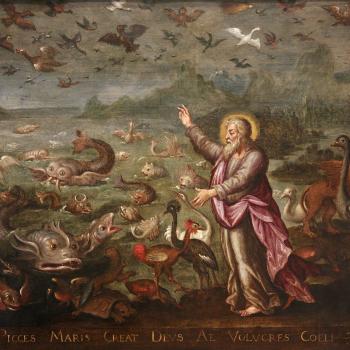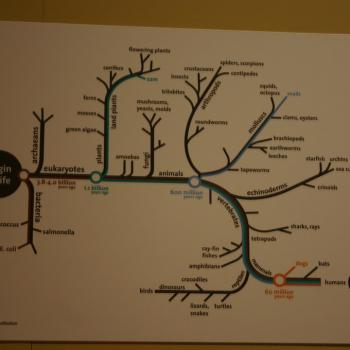
One of the worst aspects of medieval theological speculation is that it often relied upon theories about nature and the world coming from supposed authorities (like Aristotle) instead of experience. This influenced the way many viewed animals. Through centuries, indeed, millennia of undermining their potential, animals were denigrated, their rational abilities not only misunderstood but often outright denied, so that when Christians asked whether or not animals had immortal souls, the answer was no.
To have an immortal soul, many theologians suggested, one must have a rational soul. What that meant sometimes was debated, but what was rarely debated was the notion that what separated humanity from the rest of the animal world was the rational soul. That is, humans had a rational soul, the rest of animalkind did not. As this idea was believed through repetition, instead of observation, theological and philosophical ideas about animals came from imposition instead of actual study and research.
Historically, this was a problem not only for Christians, but many non-Christians as well. To be sure, the question of animal reason was raised by many of the philosophers, and there were those who actually took the time to observe animals, and among them, there were those who said that animals could and did have a sense of reason (even if it was limited in potential).
Perhaps one of the most famous philosophers to promote animal rational was Porphyry. In his Abstinence from Animal Flesh, he provided many examples to prove that animals could, indeed, did reason. Since the ability to speak was often tied to the potential to reason, Porphyry pointed out that animals did in fact communicate with each other, even if the language was not a human language, that they could and did render information to each other demonstrated they could and did reason. Likewise, animals often showed an ability to understand human speech, as they responded when called by name. The fact that animals could be trained was another indication of their reasoning ability as they showed that they were capable of learning. He also said that that they showed a sense of prudence, acting in the world according to the shape of their natural strengths and weaknesses. Similarly, he said that they possessed their own notions of justice, as, for example, could be seen in the ways bees and ants interacted with each other. Finally, among many other examples he offered, he saw within them the potential to engage the arts, with some learning how to dance, others learning how to play instruments, all demonstrating this potential could be and was often actualized.
Porphyry was not the only one who spoke for animals. Other authors, like Plutarch, also responded with similar kinds of observations. The key was that they did not just rely upon speculation and the suggestions of others, but they actually studied animals and saw them act and react, and learn from their actions. They were not mere automatons programmed to act in only one fashion but rather, they were said to be capable of learning and engaging the world with a will of their own.
Sadly, this voice, this wisdom, was often ignored. Animals were regulated as being lesser beings, as brutes without reason, and so incapable of enjoying the beatific vision. If they could not engage the beatific vision, then they were incapable of immortality. They had souls, but the souls were limited, and would perish when they died. Later, many would think animals did not even possess a soul, and so were mere objects, free to be used by humanity like any other object in the world. Although the belief that animals did not have a soul was never the official Christian position on them, it became a rather popular view which continues to be repeated to this day. This is the end product of the denigration they received by Christian polemicists who viewed them as lesser, irrational beings; as it seemed unfair for them to have souls and not partake of eternity, it seemed better to say they didn’t possess souls at all.
In recent times, things have shifted. Among scientists, who often do not think of or know of anything about souls (if they believe in souls, they realize it is a metaphysical and not a scientific truth), it has become difficult to argue animals and humans differed as a result of humans having abilities to reason while animals do not. Evolution suggested humans were a part of a larger family which include the rest of biological life on earth, with animals being closer cousins and more like humans than other forms of life. If this is true, then, many scientists began to wonder, what were animals really like; did they or did they not possess some level of intellect, reason, and emotions similar to humans? Though the answer differed from species to species, the answer which researchers found out was yes. Some were shown to have well developed languages, like prairie dogs, others, like gorillas, capable of learning to speak with humans through sign language, while others, like Porphyry understood, communicated with each other in a way which differed drastically from human communication that we might not understand all the nuances of that communication but we can see the rudiments of language involved with such communication. Animals, moreover, have shown themselves to be creative, some, like dolphins, are known not only to create tools, but to educate subsequent generations of how to use those tools. Some animals, when taken to a mirror, recognize themselves, showing high levels of self-consciousness. Animals are shown to have a wide range of emotions, with many of them mourning the loss of family and friends. The list of what scientists have learned about animals can go on and on: the point is that they are more complex, more like us than we imagined, and indeed, the reason why we did not know this before was the result of our arrogance and pride, where we did not want to see what should have been obvious to us in the first place. Or, as Laura Hobgood-Oster has noted, Christians, by rejecting science and its observations and what scientists have learned about animals, have demonstrated a dangerous level of narcissism which should be repudiated:
Yet in the last several hundred years Christianity has been hesitant, at times, to include animals in either its ethical or its theological systems. Without addressing the issue of “the animal,” Christianity not only lives in a potentially dangerous bubble, but it risks becoming increasingly narcissistic and marginal to the world as we know it, and as we are making it. [1]
Gary Kowalski explained that Christians, despite the morality taught to them by Jesus, often have found various reasons to denigrate others, to find excuses as to why some other is not to be seen as their equal. Once this is affirmed, then the other is not given equal treatment. Those who are inferior have inferior rights. This ideology remains a problem with the racism and sexism which confront us on a daily basis. Likewise, it remains a problem with various forms of speciesism. Many Christians ignore the plight of animals because they are looked on as inferiors to humanity and so have little to no rights of their own:
At various times, race, skin color, and other superficial qualities have been used to deny the rights of others and exclude them from our affection and concern. And just as nineteenth-century Europeans justified colonialism with the rationalization that “primitives” and “savages” were mentally and morally inferior, we continue to justify the exploitation of the animal world in the same way. By denying that animals possess a moral sense we tell ourselves that human beings are of a fundamentally higher order. We can therefore colonize and enslave with impunity those who are “lower.”[2]
It is this reason that many Christians have fought tooth and nail against the biological sciences and what has been taught by them. They wanted humans to be completely distinct from the rest of creation. They wanted humans to be utterly superior and to use that superiority to dominate the world instead of following the example of Christ who shows that any supposed superiority should be used for the sake of those who are weaker and vulnerable. They want to think less of animals so they do not have to face the moral questions which arise when animals are poorly treated and abused. Rejecting their ability to reason, their ability to feel and empathize like humans, indeed, their self-consciousness is a way to justify. But by doing this, such Christians demonstrate little love for God, for they limit the glory of God found in creation. This can be said to be blasphemous, because it denigrates God by denying his glory. It is an anti-Christian spirit, a spirit of anti-Christ, which dominates the thinking of many Christians. It is a spirit which must be exorcised by science, for when science and its proofs are given, such ignorance can be dispelled and the rote recitation of past opinions on animals based upon speculation instead of fact will no longer rule. Then, it will no longer be difficult for Christians to accept that animals not only have a place in the world to be respected, they will also have a place in the world to come.
[1] Laura Hobgood-Oster, The Friends We Keep: Unleashing Christianity’s Compassion for Animals (Waco, Texas: Baylor University Press, 2010), 6.
[2] Gary Kowalski, The Souls of Animals (Walpole, NH: Stillpoint Publications, 1991), 58.
Stay in touch! Like A Little Bit of Nothing on Facebook.
If you liked what you read, please consider sharing it with your friends and family!
















